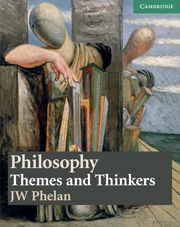Philosophy: Themes and Thinkers covers key philosophical concepts, themes, and philosophy texts. As well as gaining a thorough grounding in these areas, students will develop the ability to analyse and assess philosophical writings, form their own judgements and contribute effectively to the process of debate. Features - learning objectives at the start of each chapter - profile of notable philosophers - stimulating activities throughout - revision questions - definitions of key terms in the margin.
Features
- Learning objectives at the start of each chapter.
- Profiles of notable philosophers.
- Stimulating activities throughout.
- Review questions to test knowledge and understanding.
- End-of-chapter revision and discussion questions.
Table of Contents
- 1. Introduction
- THEMES
- 2. Theory of Knowledge
- 3. Moral Philosophy
- 4.Philosophy of Religion
- 5.Philosophy of the Mind
- 6. Political Philosophy
- 7.Philosophy of Science
- 8. Introduction to Aesthetics
- THINKERS
- 9. Plato's Republic
- 10. Aristotle's Ethics
- 11. Descartes' Meditations
- 12. Hume's Enquiries
- 13. Marx's German Ideology
- 14. Mill's On Liberty
- 15. Nietzsche's Beyond Good and Evil
- 16. Russell's Problems of Philosophy
- 17. Ayer's Language, Truth and Logic
- 18. Sartre's Existentialism and Humanism
- APPENDICES
- 19. Critical Thinking
- 20. Study Skills for Philosophy Students
- Glossary
- Endnotes
- Index.
Advice on useful tools
Advice on useful tools, activities and timetabling from teachers experiencing school closures.
Cambridge GO
All our supporting resources have now moved to Cambridge GO – the new home for your Cambridge digital content.
Listen to our podcast
Listen to our podcast to discover teaching inspiration & advice from leading educational thinkers.




